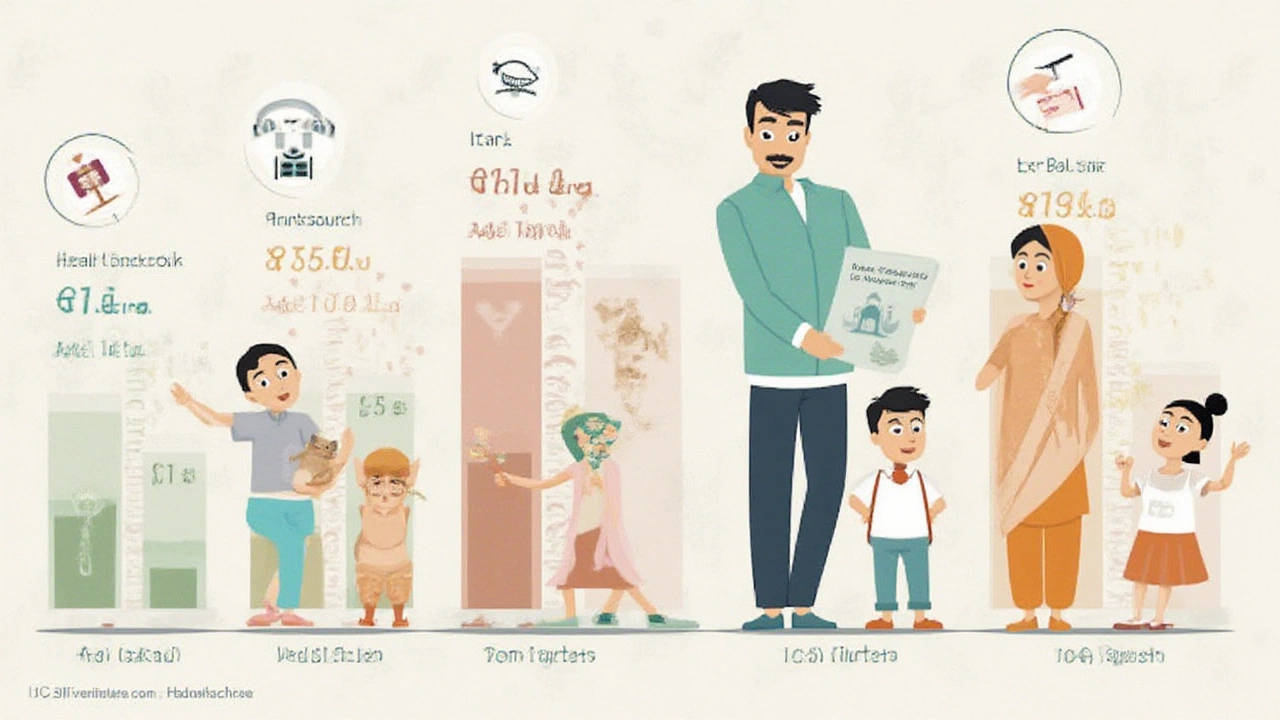Sick Leave Around the World: Which Country Offers the Most Sick Days?
 Jul, 3 2025
Jul, 3 2025
Picture this: You wake up sniffling, your head is pounding, and your body feels like it’s been through ten rounds with a bear. Is your first thought catching some extra ZZZs—guilt-free—or worrying your boss will hound you the moment you miss work? Turns out, where you live can make a huge difference in how that day plays out. Sick leave is one of those hidden job perks that can make or break your sanity, and not all countries see it the same way. Some governments practically push you back into bed, while in others, you’ll drag yourself to work with a fever because you’re afraid of losing a day’s pay—or even your job.
The Sick Leave Gold Medalists: Countries With the Most Generous Policies
So, which country gives more sick days than anyone else? If you guessed somewhere in Scandinavia, you’re onto something. Sweden famously leads the pack with a jaw-dropping policy: full-time employees can call in sick with up to 14 consecutive days at 80% pay (after a small deduction on day one) without the need for a doctor’s note for the first week. If you’re still sick after two weeks, you move onto government-paid sick leave that can last as long as you’re genuinely ill—sometimes for months or even years.
sick leave might sound great, but it gets better. Finland matches Sweden in generosity, with unlimited sick leave and 70% of pay covered by social insurance after the first few weeks. Germany is next in line, offering six weeks of 100% pay if your illness is certified by a doctor, followed by 78 weeks of government support at around 70% pay if you’re still unable to work. Norway lets you take up to one year off with full salary for the first 16 days—then the state pays for the rest. Kind of wild, right?
Check out this quick breakdown of the most generous countries (data as of 2024):
| Country | Paid Sick Days (per year) | Pay Rate | Medical Proof Needed |
|---|---|---|---|
| Sweden | Unlimited (Government pays after 14 days) | 80% (after a small initial deduction) | After 7 days |
| Finland | Unlimited (with doctor’s note) | 70% | Right away |
| Germany | 42 (full pay), up to 78 weeks (reduced) | 100% (6 weeks), then 70% | After 3 days |
| Norway | Up to 365 | 100% (16 days), then state covers | After 3 days |
| France | Unlimited (with medical certification) | 50–90% (varies) | Right away |
That’s just the tip of the iceberg. Countries like Denmark, Austria, and Belgium also have pretty sweet setups. The secret sauce? Strong government social safety nets and powerful unions that won’t let anyone get left behind if the flu knocks them out. If you’re in one of these places, your coworkers actually get worried if you show up coughing—no one thinks you’re a slacker for needing rest.
How Did Sick Leave Become a Worker’s Right?
It might seem obvious that people shouldn’t have to risk their health—or spread germs—just to keep their paycheck. But not too long ago, sick leave was a luxury, not a right. Flashback to the industrial age: workers were paid by the day, with zero protection. Get sick? Tough luck. Lose a week’s wages—or your job. The 20th century brought slow but serious change. After the Spanish Flu pandemic, companies and governments realized letting sick people slog through work was a public health disaster. Western Europe took the lead: Sweden made paid sick leave mandatory in 1955, with other Nordic countries close behind.
Union movements in places like Germany and France pushed for even longer sick leaves, citing not just personal well-being but business efficiency (face it, sick workers don’t exactly clock in record performance). Over time, paid time off for illness became a pillar of the modern welfare state, part of the wider movement for social insurance—alongside health coverage, family benefits, and unemployment protection. The argument was always the same: work should support people’s lives, not grind them down. Sure, there’s always debate about who pays (employers, government, or both), but across most of Europe, it’s seen as non-negotiable. And during the COVID-19 pandemic, sick leave rights were in the spotlight like never before. Suddenly, even countries that were strict about time off relaxed their rules to keep outbreaks under control.

Sick Days Around the World: A Look Beyond Europe
Sick leave sounds like something every worker should expect, right? Not so fast. Jump across the Atlantic, and things get fuzzy. In the United States, there’s no federal law requiring paid sick days for most private sector workers. Instead, it’s a patchwork: about 15 states, including California, New York, and Connecticut, have their own sick day laws (usually 3 to 7 days per year), but millions of Americans are still left out. If you’re lucky, your employer offers paid sick leave as a perk, but nearly 26% of US workers—especially those in hospitality and manual labor—have no coverage at all. During the pandemic, emergency laws briefly gave extra protection, but most of those rules expired after 2021.
What about Asia and elsewhere? Japan guarantees at least five days of sick leave, but it’s often lumped in with other paid time off. In China, employees get up to 24 months paid sick leave, but the pay rate drops sharply the longer you’re away. Meanwhile, Australia scores high with 10 days of paid sick leave, plus unpaid leave for extended illness—and unused days roll over to the next year. In most Latin American countries, sick leave is legally required, but enforcement is spotty and pay rates vary. Brazil’s model is robust—workers get up to 15 days of full pay (employer covers), and from day 16, social security covers up to two years, though paperwork is notorious.
In the Middle East and parts of Africa, paid sick leave depends heavily on contracts and labor laws—big companies often set their own rules. India’s national law mandates at least 12 days “casual leave” per year (which includes sick leave), but as with many rules, the reality on the ground depends on if you work for a large company or a small family-run business. No wonder a lot of people end up “working through it.”
Sick Days: Myths, Realities, and the Workplace Culture Factor
There’s more to sick leave than just laws on the books. Culture shapes how comfortable people feel taking time off. In many Asian countries, even with paid leave, there’s a “presenteeism” mindset—a belief that showing up no matter what proves dedication. In South Korea or Japan, for instance, the unwritten rule is to push through mild illness unless you’re genuinely bedridden. Companies may offer sick days, but many employees use them only if they’re hospitalized or have a severe flu. It’s like a badge of honor to tough it out.
Don’t think Western countries are immune to this. The UK, for example, has a tradition called “soldiering on,” where people push through minor illnesses at work or, in recent years, when working from home. There’s a common myth that generous sick leave policies lead to chronic absenteeism or people faking illness. But real-world data tells a different story. Sweden, Norway, and Germany—with some of the world’s best sick leave policies—report absenteeism rates of 3-4% of total working time, not much higher than stricter countries. A 2022 report from the European Foundation for the Improvement of Living and Working Conditions found the main reasons for abuse are poor job satisfaction—not the policy itself.
Another myth? That only desk workers get good sick day deals. In fact, retail, food, and healthcare staff are usually hardest hit by poor policies, especially in the US. When you rely on physical presence and low pay, missing work can destroy a month’s budget. That’s why public health experts have called for minimum sick leave rights in every job—not just cushy office posts. Without it, flu outbreaks are harder to contain and chronic illness gets worse.
One thing that’s clear: having a generous policy doesn’t mean everyone takes advantage. Trust in management, supportive HR, and a stigma-free environment make workers more likely to only stay home when truly needed—and bounce back faster, too.

How to Navigate Sick Leave in Your Country: Tips for Staying Protected
Now you’re probably wondering—what’s the best way to handle sick leave where you live or work? The honest answer: know your rights. Start by looking up national labor laws, but don’t stop there. Company handbooks and HR policies often add extra benefits, especially at bigger firms.
Here’s a quick tip list that works almost anywhere:
- If you’re sick, tell your boss ASAP—even if your contract doesn’t require it. This builds trust and helps with planning.
- Keep records. In Europe, managers expect a text or email, sometimes even a doctor’s note for longer absences.
- Check how pay rates work—does it drop after a week, or stay steady? Know who pays: your employer, state health insurance, or both.
- If you’re in a new job, ask about sick pay during onboarding. Don’t be shy—this is standard in many countries.
- For serious, long illnesses, find out if you’re covered by government disability benefits. Many people miss out on pay by not applying in time.
- If your job is in the gig economy (like driving for Uber or freelancing), sick pay is usually not guaranteed. Some platforms, like in the UK, have started offering “sick pay insurance” for a small fee each month. Look into local pilot programs.
Feeling nervous about using your sick days? You’re not alone. Survey after survey shows people fear backlash—even when they have clear rights. If possible, communicate honestly with your boss or HR team. The best companies understand healthy workers are productive workers. If you face pushback, consider reaching out to a workers’ association or labor lawyer. In many places, unfair sick leave denial is legally protected—even if employers pretend otherwise.
Above all, remember: rest helps you heal and stops the spread of germs. If you live someplace with stingy leave policies, it’s still smart to document your illness, hang onto receipts, and push for legislative change where you can. You never know when your voice might move the needle.